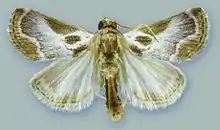Schacontia speciosa
Schacontia speciosa is a moth of the family Crambidae described by Maria Alma Solis and Paul Z. Goldstein in 2013. It is found in south-eastern Brazil.
| Schacontia speciosa | |
|---|---|
 | |
| Male holotype | |
| Scientific classification | |
| Kingdom: | |
| Phylum: | |
| Class: | |
| Order: | |
| Family: | |
| Genus: | |
| Species: | S. speciosa |
| Binomial name | |
| Schacontia speciosa Solis & Goldstein, 2013 | |
The length of the forewings is 7.5–8 mm. The medial area of the forewings is grey, partially suffused with white. The postmedial line is shaded with white outwardly and brown inwardly. The basal and submarginal areas are primarily mocha brown. The hindwings are brownish white, with no contrasting markings.[1] Adults have been recorded on wing in October.
Etymology
The specific epithet is from the Latin for showy or handsome.
References
- Goldstein, Paul Z.; Metz, Mark A.; Solis, M. Alma (2013). "Phylogenetic systematics of Schacontia Dyar with descriptions of eight new species (Lepidoptera, Crambidae)". ZooKeys. 291: 27–81. doi:10.3897/zookeys.291.3744. PMC 3677288. PMID 23794861.
| Wikimedia Commons has media related to Schacontia speciosa. |
| Wikispecies has information related to Schacontia speciosa. |
This article is issued from Wikipedia. The text is licensed under Creative Commons - Attribution - Sharealike. Additional terms may apply for the media files.